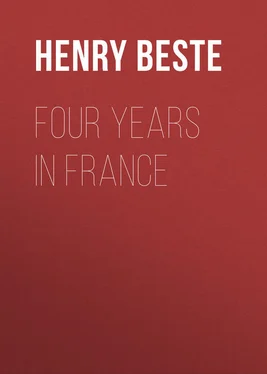Henry Beste - Four Years in France
Здесь есть возможность читать онлайн «Henry Beste - Four Years in France» — ознакомительный отрывок электронной книги совершенно бесплатно, а после прочтения отрывка купить полную версию. В некоторых случаях можно слушать аудио, скачать через торрент в формате fb2 и присутствует краткое содержание. Жанр: foreign_antique, foreign_prose, Путешествия и география, на английском языке. Описание произведения, (предисловие) а так же отзывы посетителей доступны на портале библиотеки ЛибКат.
- Название:Four Years in France
- Автор:
- Жанр:
- Год:неизвестен
- ISBN:нет данных
- Рейтинг книги:4 / 5. Голосов: 1
-
Избранное:Добавить в избранное
- Отзывы:
-
Ваша оценка:
- 80
- 1
- 2
- 3
- 4
- 5
Four Years in France: краткое содержание, описание и аннотация
Предлагаем к чтению аннотацию, описание, краткое содержание или предисловие (зависит от того, что написал сам автор книги «Four Years in France»). Если вы не нашли необходимую информацию о книге — напишите в комментариях, мы постараемся отыскать её.
Four Years in France — читать онлайн ознакомительный отрывок
Ниже представлен текст книги, разбитый по страницам. Система сохранения места последней прочитанной страницы, позволяет с удобством читать онлайн бесплатно книгу «Four Years in France», без необходимости каждый раз заново искать на чём Вы остановились. Поставьте закладку, и сможете в любой момент перейти на страницу, на которой закончили чтение.
Интервал:
Закладка:
A boat conveyed us to the packet: we set sail, if setting sail it might be called, when there was hardly wind to swell the canvass. The air was sultry, the sky was cloudy; and when we had cleared the Isle of Wight, and night was coming on, there was every appearance of an approaching storm: Captain Wood even allowed that there might be "a puff." I admired the self-possession he maintained, notwithstanding the troublesome questions put to him, and expressions of fear and anxiety from the passengers: answering every one with the greatest civility, he yet never turned aside from the conduct of the vessel. "It is silly in us, captain, to disturb you thus: we might trust to you." – "Sir, my son and I are on board: the vessel cost me three thousand pounds." I drew the inference desired, and left him.
With every inclination, after the event, to begin my book with a description of a storm at sea, as Virgil begins his Æneid, I forego this attempt at amusing my reader, for two reasons: without the machinery of Juno, Æolus, and Neptune, the storm even of Virgil would hardly be raised in dignity above a common occurrence; and next, because my storm was really a very moderate one, hardly sufficient to excite that degree of terror in me, and of pity in others, which is necessary to sublimity. In sober guise then, I have to relate that it rained, lightened, and thundered; but thunder at sea, I remarked, is not so loud as thunder heard on land, re-echoed by houses and buildings: and lightning in that vast space does not seem so directly aimed at one, as when flashed into one's face through the narrow boundary of a window. The rolling of the sea was not very violent; but the wind drove us out of our course, and we found ourselves, in the morning, to the eastward of Fécamp. We could with the greatest ease have entered the port of Dieppe: I proposed to the captain to do so; but his affairs and his port papers, which this little stress of weather was not a sufficient excuse for contravening, recalled him to Havre. The other passengers also were desirous of landing at Dieppe; but rules and regulations, – a phrase which I translated into English for the benefit of a certain provincial book club, which had thus entitled its by-laws, rules, and rulations , – at every step vexatiously and uselessly embarrass the intercourse of mankind.
In the present case we had to employ sixteen hours in working our way back again towards Havre. The voyage was, however, pleasant. We were, all the while, almost within a stone's throw of the French coast: we talked with several fishermen: we seemed to be all but landed. The clouds, which had so thickly covered the sky, and poured down so much rain the preceding night, had passed away to the eastward. In the afternoon, a brilliant rainbow was stretched across the channel, and seemed to unite, by an aërial arch, the countries of France and England. Our impatience was put to the proof by a calm, which arrested our progress for two hours: the elements seemed to have conspired to treat us with a specimen of every sort of weather that can be experienced at sea. At last a breeze sprung up; slowly we crept along towards the mouth of the Seine; and a quarter of an hour before midnight entered the port of Havre, after a voyage of thirty-two hours, the latter half of which was useless to my purpose of coming to France, and would have been dangerous had the storm come on again, as we were close on the rocks, and had very little sea-room.
The passage by Dover takes the traveller from London to Paris about a hundred miles out of his way. Brighton is the point of the English coast nearest to Paris; but, though the opposite harbour of Dieppe is good, the embarkation and disembarkation at Brighton is exposed to all the violence of the winds and waves. The passage from Southampton may be performed in ten hours, and Havre is very little further than Dieppe from the capital of France.
Before we entered the harbour, our steward descended to extinguish a large lamp that burnt in the cabin: he gave us (that is, to me and my sons) our choice of going on deck, or staying below in the dark: we loitered, and were punished afterwards for our delay by breaking our shins against the cabin stairs. The vessel was not allowed to enter the port with a light on board; a lantern is hung out on the prow. The use of the lantern is evident: it is not quite so clear why our lights were to be put out: against an accidental fire this was no sufficient precaution; had we wished to set our vessel in a state of conflagration, and run her amongst the French shipping, nothing was requisite but a tinder-box, or a gallipot of phosphorus. Regulations seem to be made sometimes, in order that those who are in employment may have something to do: work is invented for places, instead of places being created on account of work.
We waited some little time for the officer of the port, who was to receive our passports. I stood on the deck, and looked around on the light-house, the shipping, and the lights from the windows; heard the mixture of French and English bandied in talk between us on board and those on shore, and was delighted with these assurances that we were restored to human life and society, and no longer tossed on the sea, where, as Homer says, there are no vintages. I quote this expression, not because I am insensible to the beauty of a poetical amplification, but for three reasons: first, to show my learning, – a motive which I by no means approve, but leave it to be appreciated by other authors: secondly, because this epithet conveys precisely the reason of my dislike of sea voyages: Edie Ochiltre says, "the worst of a prison is, that one can't get out of it;" and I say, the worst of the sea is, that it is not dry land; an objection in both cases essential and fatal: thirdly, I wish to make a remark, which has, I believe, escaped all former commentators, – that Homer had probably no more notion of lands in which there were no grapes, than the African prince of walking on the surface of a river.
The tide had raised our deck to the level of the quay: the clock struck twelve; it was now the anniversary of the birth of my younger son, and we set our feet on the soil of France. The other passengers had announced their intention of going, in a mass, to the English inn, where a part of my family, three months later, found, what was to be expected, high charges; and, what was not to be expected, plenty of bugs. Fearing a contest for beds amongst such a number, (for there were ten or twelve of us,) and the delay of getting them ready for so many, I went to the Hôtel de la Ville du Havre, recommended by Captain Wood, who conducted us thither, roused the sleeping family, introduced, and left us! M. and Madame Marre appeared in night-cap and dressing-gown, very much resembling (I say it with all due respect for very worthy persons,) the caricatures of French physiognomy exhibited in our print-shops. Madame Marre told the chamber-maid to show me the beds: I went up stairs, and on my return was asked if I was contented with what the "bonne" had shown me. I have heard of an old lady who was very much offended by being called good woman; and the expression "la bonne" appeared to me a contemptuous one: such a novice was I, that I looked at the girl to see whether she took it as an affront or a compliment; she was quite unmoved. I told the mistress that the three beds were very good, and desired to see the sheets: they were more than damp; they might be said to be wet: to have them aired at one in the morning was out of the question; our resource was to do without them for that night. I know an English family who, arriving early in the evening at an inn in France, and, as a matter of course, ordering the sheets to be aired, were charged, the next morning, five francs for fire-wood. Our sheets were aired, on the next day, without any instructions on our part to that effect, according to the custom of the country, au soleil .
Читать дальшеИнтервал:
Закладка:
Похожие книги на «Four Years in France»
Представляем Вашему вниманию похожие книги на «Four Years in France» списком для выбора. Мы отобрали схожую по названию и смыслу литературу в надежде предоставить читателям больше вариантов отыскать новые, интересные, ещё непрочитанные произведения.
Обсуждение, отзывы о книге «Four Years in France» и просто собственные мнения читателей. Оставьте ваши комментарии, напишите, что Вы думаете о произведении, его смысле или главных героях. Укажите что конкретно понравилось, а что нет, и почему Вы так считаете.











